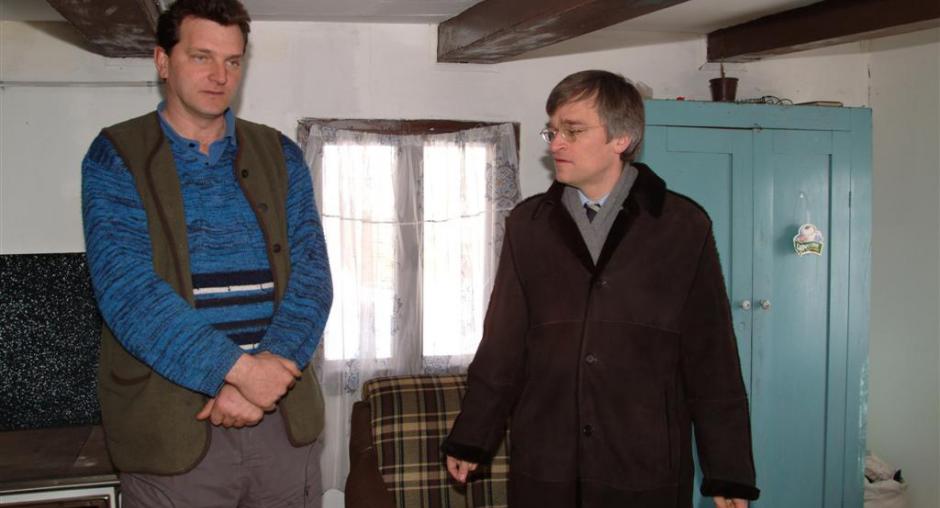Newsroom
OSCE Mission Head presents three-year review of Croatia
VIENNA 10 March 2005

Nedjeljko Vukdragovic (left) tells OSCE Mission Head Peter Semneby of the daily struggles living as a returnee, 10 February 2005. (OSCE) Photo details
VIENNA, 10 March 2005 - Ambassador Peter Semneby today presented to the OSCE Permanent Council an overview of his last three years as the Head of the OSCE Mission to Croatia as well as priority issues for the future.
The presentation, made at the invitation of the Slovenian Chairmanship of the Organization, highlighted the significant positive developments that have been made in many important areas since his arrival in Croatia three years ago.
"Croatia has made remarkable and well-deserved progress from the devastation of war less than 10 years ago to the threshold of EU negotiations," said Ambassador Semneby. "This gives a positive incentive to other south Eastern European countries to continue to implement difficult reforms".
He observed, however, that almost a decade after the end of the 1991/95 conflict, war-related issues continued to surface on the political scene.
"At the same time," said Ambassador Semneby, "there are some important areas where progress has not met expectations, and where Croatia still needs to make efforts to live up to standards set by the OSCE, the Council of Europe and the European Union,"
He stated that progress in creating conditions for refugee return has been slower than expected, with the implementation of a key housing programme for the last big category of refugees without a housing option—those who lived in socially owned flats in parts of Croatia that were under government control during the war—severely delayed. He also deplored the lack of basic infrastructure, such as electricity, in rural return areas.
Persistent bottlenecks and lack of professionalism continue to hamper the reform of the judicial system, added Ambassador Semneby. Insufficient professionalism in lower courts is demonstrated by ethnic bias in war crime trials and property repossession cases involving Serb refugees.
He noted that there was a persistent absence of effective programmes for minority representation in public administration, courts and police. Of concern are the deteriorating relations between the government and some civil rights NGOs.
Speaking about an evolving agreement between the OSCE Mission and the Government of Croatia on remaining tasks for the Mission's mandate to be considered fulfilled, Ambassador Semneby said he expected that the OSCE Mission would continue to play a useful supportive role for the Croatian authorities in their reform efforts for sometime to come.
The presentation, made at the invitation of the Slovenian Chairmanship of the Organization, highlighted the significant positive developments that have been made in many important areas since his arrival in Croatia three years ago.
"Croatia has made remarkable and well-deserved progress from the devastation of war less than 10 years ago to the threshold of EU negotiations," said Ambassador Semneby. "This gives a positive incentive to other south Eastern European countries to continue to implement difficult reforms".
He observed, however, that almost a decade after the end of the 1991/95 conflict, war-related issues continued to surface on the political scene.
"At the same time," said Ambassador Semneby, "there are some important areas where progress has not met expectations, and where Croatia still needs to make efforts to live up to standards set by the OSCE, the Council of Europe and the European Union,"
He stated that progress in creating conditions for refugee return has been slower than expected, with the implementation of a key housing programme for the last big category of refugees without a housing option—those who lived in socially owned flats in parts of Croatia that were under government control during the war—severely delayed. He also deplored the lack of basic infrastructure, such as electricity, in rural return areas.
Persistent bottlenecks and lack of professionalism continue to hamper the reform of the judicial system, added Ambassador Semneby. Insufficient professionalism in lower courts is demonstrated by ethnic bias in war crime trials and property repossession cases involving Serb refugees.
He noted that there was a persistent absence of effective programmes for minority representation in public administration, courts and police. Of concern are the deteriorating relations between the government and some civil rights NGOs.
Speaking about an evolving agreement between the OSCE Mission and the Government of Croatia on remaining tasks for the Mission's mandate to be considered fulfilled, Ambassador Semneby said he expected that the OSCE Mission would continue to play a useful supportive role for the Croatian authorities in their reform efforts for sometime to come.
